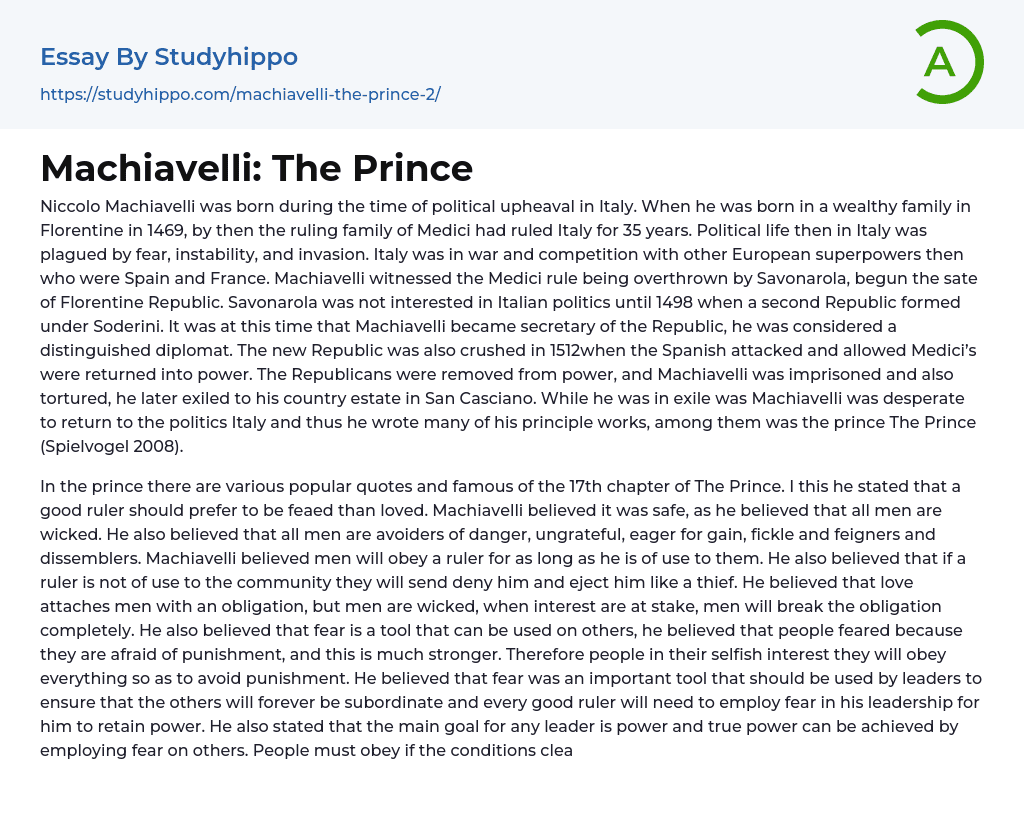Niccolo Machiavelli was born in 1469 into a wealthy family in Florentine, amidst the political turmoil that engulfed Italy. The ruling Medici family had held power for 35 years, but fear, instability, and invasion plagued Italy due to war and rivalry with other European powers like Spain and France. Machiavelli witnessed the fall of Medici rule at the hands of Savonarola, leading to the establishment of the Florentine Republic. In 1498, another Republic emerged under Soderini, appointing Machiavelli as its secretary and recognizing him as an esteemed diplomat. However, Spanish forces attacked in 1512, resulting in the downfall of the new Republic and the return of power to the Medici family. The Republicans were ousted from authority; Machiavelli suffered imprisonment and torture before being banished to his rural estate in San Casciano. Throughout his exile period, Machiavelli yearned fo
...r a return to Italian politics which fueled his writing endeavors including his renowned work "The Prince" (Spielvogel 2008).
The 17th chapter of The Prince is renowned for its collection of famous quotes and popular statements. Machiavelli argues that a good ruler should prioritize instilling fear rather than seeking love from their subjects. He believes this approach to be prudent, as he views all men as inherently wicked. According to Machiavelli, men are inclined to avoid danger, exhibit ingratitude, pursue personal gain, act capriciously, and feign authenticity. Additionally, Machiavelli asserts that individuals will obey a ruler only as long as they find him useful. However, if a ruler fails to benefit the community, the people will reject him like a thief. Love creates an obligatory bond between people in Machiavelli's perspective; however, when personal interests come into play
individuals easily break this bond. In contrast, fear is a more potent tool according to Machiavelli. He maintains that people fear punishment and therefore obediently follow orders in order to avoid it. Consequently, out of self-interest alone, individuals comply with everything in order to evade punishment. For leaders to maintain their power according to Machiavelli's argumentation they must employ fear as an essential instrument of leadership. He emphasizes that power is the ultimate goal for any leader and true power can only be acquired by imposing fear upon others.Furthermore,it is crucial for people to adhere to the conditions set forth by their leadersFailure to adhere to Machiavelli's belief that the use of cruelty is not advocated without purpose carries consequences for their actions, as he saw it as a necessary means to maintain authority.
In his book, Machiavelli emphasized the importance of a leader avoiding hatred and instead ensuring popularity among his subjects. He warned that if a leader is despised by his people, it increases the likelihood of secret plotting and rebellion. To maintain order and hold onto power, a leader must prioritize the satisfaction of the majority.
Machiavelli also believed it was crucial for the army's leader to exhibit cruelty towards his subordinates, as it would foster unity and preparedness. By establishing a reputation for cruelty, a ruler can deter attacks from potential adversaries.
While Machiavelli wrote The Prince with the intention of winning favor from the Medici government, many dictators have embraced and implemented its teachings, resulting in immense suffering for their citizens. Present-day leaders in countries like Burma and North Korea continue to adhere to Machiavellian principles.
- Federal government essays
- Armed Forces essays
- Confederate States Of America essays
- Federal Government Of The United States essays
- Fourteenth Amendment To The United States Constitution essays
- Governance essays
- Parliament essays
- Politics essays
- Jurisdiction essays
- Bureaucracy essays
- Separation Of Powers essays
- Congress essays
- President essays
- United States Congress essays
- Non-Commissioned Officer essays
- Appeal essays
- Revenge essays
- Corporate Governance essays
- Public Service essays
- Income Tax essays
- Supply essays
- Red Cross essays
- Democracy essays
- State essays
- Liberty essays
- Absolutism essays
- Reform essays
- Republic essays
- John Marshall essays
- Bourgeoisie essays
- Developed Country essays
- Elections essays
- International Relations essays
- Left-Wing Politics essays
- Monarchy essays
- Political Corruption essays
- Political Party essays
- Political Science essays
- Sovereign State essays
- United Nations essays
- World Trade Organization essays
- Contras essays
- Dictatorship essays
- Foreign policy essays
- Monarch essays
- Corruption essays
- Foreign essays
- Democratic Party essays
- European Union essays
- President Of The United States essays




